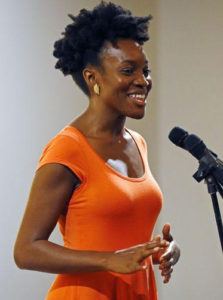 On Saturday, August 12th Rachel Egboro will be conducting a two-hour introductory storytelling workshop. Rachel is the co-founder of thestoryline.org, a Phoenix storytelling collective. During the workshop, Rachel will give some simple steps to begin and develop a story for an audience. The workshop costs $25 and will be at the Changing Hands Phoenix location. You can find more information and buy tickets here.
On Saturday, August 12th Rachel Egboro will be conducting a two-hour introductory storytelling workshop. Rachel is the co-founder of thestoryline.org, a Phoenix storytelling collective. During the workshop, Rachel will give some simple steps to begin and develop a story for an audience. The workshop costs $25 and will be at the Changing Hands Phoenix location. You can find more information and buy tickets here.
NonFiction
Authors Talk: Steven Faulkner
 Today we are pleased to feature author Steven Faulkner as our Authors Talk series contributor. Steven’s podcast is a unique treat: he has recorded his nonfiction piece from Issue 14 with guitar accompaniment. Steven’s voice blends with the lull of the guitar to create a truly moving work of art. His essay reflects on the life of his youngest child, Alex, as he grows up. Steven begins by describing Alex’s birth and ends when Alex “is 22 years old” and “[h]is father and mother have little influence,” with many anecdotes to fill the time in between.
Today we are pleased to feature author Steven Faulkner as our Authors Talk series contributor. Steven’s podcast is a unique treat: he has recorded his nonfiction piece from Issue 14 with guitar accompaniment. Steven’s voice blends with the lull of the guitar to create a truly moving work of art. His essay reflects on the life of his youngest child, Alex, as he grows up. Steven begins by describing Alex’s birth and ends when Alex “is 22 years old” and “[h]is father and mother have little influence,” with many anecdotes to fill the time in between.
Steven Faulkner is the author and reader. John Hogge is the guitarist, and John Holloway is the audio engineer.
As you listen to Steven’s essay, “Photo Album on a Westbound Train,” you can also read along in Issue 14 of Superstition Review.
Contributor Update: Emily Matyas and SEE magazine
SEE Magazine recently began their series, “The Importance of Being Churro: The Sheep at the Heart of Navajo Culture.” The magazine was co-founded by previous contributor Emily Matyas, who provides photographs for the article. In part one, Colleen Oakes provides a broad introduction to the contemporary struggles facing Navajo traditions that starts with raising Churro sheep. The article is accompanied by powerful interviews and stunning photography. 
You can check out Emily’s work for Superstition Review in Issue 14 here.
Authors Talk: William J. Cobb
 Today we are pleased to feature author William J. Cobb as our Authors Talk series contributor. William talks about his essay “The Altered States of Stuffed Animals” which was inspired by his daughter’s collection of stuffed animals. He goes on to say that he has a complicated relationship with stuffed animals one that is, “usually dismissive, [and] begrudgingly sentimental.”
Today we are pleased to feature author William J. Cobb as our Authors Talk series contributor. William talks about his essay “The Altered States of Stuffed Animals” which was inspired by his daughter’s collection of stuffed animals. He goes on to say that he has a complicated relationship with stuffed animals one that is, “usually dismissive, [and] begrudgingly sentimental.”
You can read William’s piece, “The Altered States of Stuffed Animals,” in Issue 17 of Superstition Review.
Contributor Update: Laura Esther Wolfson
 We have some great news from past contributor Laura Esther Wolfson. Laura’s essay collection, Proust at Rush Hour, has won the 2017 Iowa Prize in Literary Nonfiction. The book is forthcoming from the University of Iowa Press in the spring of 2018.
We have some great news from past contributor Laura Esther Wolfson. Laura’s essay collection, Proust at Rush Hour, has won the 2017 Iowa Prize in Literary Nonfiction. The book is forthcoming from the University of Iowa Press in the spring of 2018.Authors Talk: Kirsten Voris
 Today we are pleased to feature author Kirsten Voris as our Authors Talk series contributor. In her podcast, Kirsten discusses her discovery of the different stories you can tell you about yourself. She reveals, “When I choose a version of reality to sell in an essay, what I’m really doing is selling the idea to myself. I’m deciding what kind of a story I want to tell me about myself.” Kirsten also discusses her process, her writing partner, and how she’s learned that “not writing is essential to writing.”
Today we are pleased to feature author Kirsten Voris as our Authors Talk series contributor. In her podcast, Kirsten discusses her discovery of the different stories you can tell you about yourself. She reveals, “When I choose a version of reality to sell in an essay, what I’m really doing is selling the idea to myself. I’m deciding what kind of a story I want to tell me about myself.” Kirsten also discusses her process, her writing partner, and how she’s learned that “not writing is essential to writing.”
You can access Kirsten’s piece, “The Walk Through,” in Issue 18 of Superstition Review.
Contributor Update: Kelle Groom
 Today we have some exciting news from previous contributor Kelle Groom. Kelle’s new collection of poetry, Spill, is now available through her website here. The collection has already received some high praise on her website. Sophie Cabot Black says of the collection, “Kelle Groom’s newest book of poems tells it slant, as we are tipped into her world with a hand that seems both inconsolable and utterly aware.”
Today we have some exciting news from previous contributor Kelle Groom. Kelle’s new collection of poetry, Spill, is now available through her website here. The collection has already received some high praise on her website. Sophie Cabot Black says of the collection, “Kelle Groom’s newest book of poems tells it slant, as we are tipped into her world with a hand that seems both inconsolable and utterly aware.”
The book will be available October 10th through Anhinga Press. You can check out her powerful nonfiction piece “Dear Baby” in issue 13 of Superstition Review here.
Contributor Update: Alison Hawthorne Deming
Hello everybody! Today, we here at Superstition Review are thrilled to announce that past contributor Alison Hawthorne Deming, who read for us back in April of 2011, has just been named Regents’ Professor at the University of Arizona, by the Arizona Board of Regents. To be named a Regents’ Professor is the highest honor that can be bestowed on a faculty member in the university system, and we can think of none more deserving than Alison Hawthorne Deming. You can read the full press release here, and if you’re interested in Alison’s work, check out her most recent publications: a new book of poetry titled”Stairway to Heaven,” out now from Penguin (found here), and her collaboration with photographer Stephen Strom, titled “Death Valley: Painted Light” (found here). Congratulations to Alison and the University of Arizona!

Guest Post: Patrick Madden, Some Notes on Expectations
My daughter loves this riddle I told her:
You are driving a bus. At the first stop, 7 people get on. At the next stop, 3 more get on. At the third, 2 get off and 5 get on. At the fourth, no one gets on and 2 get off. At the fifth, 7 get off and 1 gets on. At the sixth stop, 2 get on and 2 get off. At the seventh, 10 people get on and 3 get off. What is the bus driver’s name?
 Reading it here, you can easily figure it out, because you can return to the text and reread, but aloud, this gets people (nearly) every time, because once they hear the numbers, they start trying to do arithmetic, thinking you’re going to ask them how many people are left on the bus. I apologize for stating the obvious. The point of the riddle is misdirection, a subversion of expectations that’s satisfying in its cleverness instead of frustrating. This is just one example of this principle in action. One might easily point to most Hollywood movies, for instance, with their twists and turns to keep viewers guessing. I know this, and you know this, but I hope it’s worth revisiting briefly here, as I retread some of my own path to realizing it (making it real), and applying it to essay writing, specifically.
Reading it here, you can easily figure it out, because you can return to the text and reread, but aloud, this gets people (nearly) every time, because once they hear the numbers, they start trying to do arithmetic, thinking you’re going to ask them how many people are left on the bus. I apologize for stating the obvious. The point of the riddle is misdirection, a subversion of expectations that’s satisfying in its cleverness instead of frustrating. This is just one example of this principle in action. One might easily point to most Hollywood movies, for instance, with their twists and turns to keep viewers guessing. I know this, and you know this, but I hope it’s worth revisiting briefly here, as I retread some of my own path to realizing it (making it real), and applying it to essay writing, specifically.
Over the years, as I read and wrote and taught and critiqued thousands of essays, I formulated an observation into a theory. For context, you should know that, including graduate school, I’ve been at this essay thing semi-professionally for twenty years. Through reading and writing countless good and bad examples, I came to feel that the best essay endings worked their way backwards through the text to shift a reader’s understanding of the whole, to reconfigure interpretation from a new insight. Thus, the endings were a surprise that made sense; they granted an insight beyond what I would have come to on my own, but not beyond what was reasonable. I became fond of saying that this represented a surprising inevitability (or inevitable surprise).
While I never thought myself original for noticing this (and creating a handily chiastic catchphrase to describe it), it took me quite a while to discover that Aristotle had theorized essentially the same thing in the Poetics:
Such an effect [Tragedy inspiring fear or pity] is best produced when the events come on us by surprise; and the effect is heightened when, at the same time, they follow as cause and effect. The tragic wonder will then be greater than if they happened of themselves or by accident; for even coincidences are most striking when they have an air of design. …
A Complex action is one in which the change is accompanied by such Reversal, or by Recognition, or by both. These last should arise from the internal structure of the plot, so that what follows should be the necessary or probable result of the preceding action. It makes all the difference whether any given event is a case of propter hoc or post hoc.
That is, “because of this” versus simply “after this.” We want causation, not simply correlation. “The king died and then the queen died” is not a proper story. No, wait. It is a story, according to Forster, but it’s not a plot. A plot requires not only “a narrative of events arranged in their time-sequence,” but a sense of causality (“then the queen died of grief”). For context, you should know that Aristotle’s source texts were epic poems and plays, and Forster’s focus was the novel, primarily. And here we are talking of essays, mostly, though the principles, as I have said, apply broadly.
Expectations affect not only endings, influence not only twists of plot and action. When we read, we bring myriad expectations to the text, from the most basic (that it will be decipherable), through the conventional (that it will exemplify proper grammar), through the contextual (that it will present to us a world we recognize or, sometimes, characters that we “relate to”), to the transcendental (that it will satisfy in us a spiritual yearning we didn’t quite know we had). We read through our expectations at every turn, and every straightaway, too.
No one’s expectations are infallible; no reader is ideal. Yet I am paid to read others’ work and offer my honest critique, asking them questions and suggesting ways to improve. Perhaps the commonest category of misstep I find in draft work has to do with failing to meet or anticipate readers’ expectations, failing to consider the expansiveness of language and the way ambiguities can be detrimental, even antagonistic to readers. I tell my students that I am a lazy, impatient, intentional misreader. I expect them to do the work of considering their words and phrases and rooting out unintentional misreadings. Because I will misread them every chance they give me, I say. We laugh, but they know I’m serious.
I find such problems all the time, but I suppose I ought to include here an example. So I’ve asked permission of one of my students, whose recent essay caused me and her classmates a slight bit of consternated amusement. The essay was titled “Love Bursts,” which pressed play on my mental boom box with a two-song playlist of Def Leppard’s “Love Bites” and Nazareth’s “Love Hurts,” each of which strings together a litany of bad things love does (scars, wounds, marks, bleeds, brings me to my knees, etc.). [I could, too, have remembered the Everly Brothers’ original “Love Hurts,” or covers by Roy Orbison or Cher or… and who can forget the J. Geils Band’s “Love Stinks”? {rip J. Geils, who died a few days ago, and who was raised, I’ve just learned, the next town over from my hometown in New Jersey}]
Anyway. “Love Bursts” seemed obviously a sentence, subject-verb. Bursting was something love did. This determined my reading. And the first section did nothing to revise my expectation, as the author returned to her childhood, to a night she spent with her aunt and cousins in a hotel. Her mother had allowed her to go only on the condition that she not wet the bed. Uh oh. You know what’s going to happen next, don’t you? Our narrative expectations are primed. But they’re also confirmed in their reading of the title. Love bursts… we’ve got a bladder ready to burst in the nighttime, so… It’s obvious.
Only it wasn’t. The section ends in a display of auntly love, with smiles and bubble bath and not a hint of anger or frustration. Only later in the essay, two-thirds of the way through, does the title reconfigure into an adjective-noun phrase. It’s been about bursts of love all along, but I didn’t know it. I felt a bit misled. The author, knowing from the get-go how to apprehend the titular phrase, was surprised at my (and most of the class’s) misreading. It’s important to note that I don’t believe her to be wrong with her title choice; I just want her to think more broadly about potential meanings.
The advice part of this essay will be brief and general (“feeling myself too ill-instructed to instruct others” — Montaigne): Try to be aware of the various readings and meanings readers may come to give your text. Understand language not as denotative but as accumulative and tentative, words in order forming constellations from which meaning emerges. Anticipate your readers’ questions and objections, and avoid problems or address them as you write (perhaps even in direct address; the essay is wonderfully open to such meta-textuality).
If I weren’t already past the respectable word limit for blog posts, I’d talk us through an expert example of managing expectations, but instead, among so many possible models, I will simply exhort you to read Brian Doyle’s “His Last Game,” which was a Best American Essay in 2013. Savor how it both confirms and subverts your expectations throughout. To wrap up, then:
I love this story my mother told us. For context, you should know that for many years she worked as a secretary at a law firm that handled lots of motor vehicle cases.
You need to have uninsured motorist insurance. With the cases I see every day… there’s a lot of people out there driving around without insurance, or without enough insurance. And if one of them hits you… you’ll be on the hook for the damages. For years I kept telling Chris Leone, “Chris, you need to get uninsured motorist insurance,” and she wouldn’t listen. “Liz,” she’d say. “You worry too much.” But I kept telling her, for years, and finally she got uninsured motorist insurance.
You know what’s going to happen next, don’t you? And while you’re sad for Chris, at least you’re glad that she got uninsured motorist insurance just in time.
Except… in time for what? Nothing happened. Nobody hit Chris. Chris didn’t hit anybody. “Mom!” we laughed. “This is the part where an uninsured motorist hits Chris’s car, and…”
“No,” said Mom. “That’s it. She got the insurance. Now she’s covered.”
For context, you should know that almost exactly a year ago, my mother died of cancer. Because she had smoked almost her entire adult life, we long knew that the day would come, yet I echo what many have said: you’re never really prepared. Despite the disarming pain that still catches me unawares and plunges me into a deep melancholy, I am grateful that her whole family, her husband and all of her children and our spouses and her grandchildren, and many of her friends, gathered from near and very far to spend her last days with her, when she was still awake and aware and laughing and praying and telling us all how much she loved us. When she was gone, or nearly gone, I don’t quite remember, we told this story to each other and it was a salve to our wounds.
Authors Talk: Meghan McClure and Michael Schmeltzer
 Today we are pleased to feature authors Meghan McClure and Michael Schmeltzer as our Authors Talk series contributors. Meghan and Michael were brought together when they both had poems published in Issue 6; more recently, they collaborated on a work of creative nonfiction, A Single Throat Opens, which releases in June.
Today we are pleased to feature authors Meghan McClure and Michael Schmeltzer as our Authors Talk series contributors. Meghan and Michael were brought together when they both had poems published in Issue 6; more recently, they collaborated on a work of creative nonfiction, A Single Throat Opens, which releases in June.

In their podcast, the pair says that the best advice they can give to a writer who wants to improve their writing is to read. Meghan says, “I think that writers and just people in general should read widely until you want to read deeply.” Michael echoes this and adds, “Read what interests you, first and foremost.” Meghan and Michael then delve into book recommendations; not only are these books that they love, but they are books that they believe will help writers better their own craft. For example, they offer recommendations that will teach you how to be observant, how to look at family in a different way, how to read and write through the lens of obsession, how to put together a linked collection, and more!
You can access Meghan’s pieces in Issue 6 and Issue 18 of Superstition Review, and you can access Michael’s pieces in Issue 6 and Issue 10. You can also preorder A Single Throat Opens here.